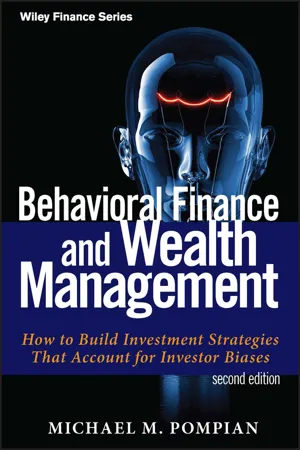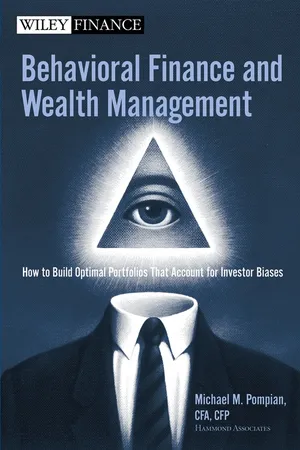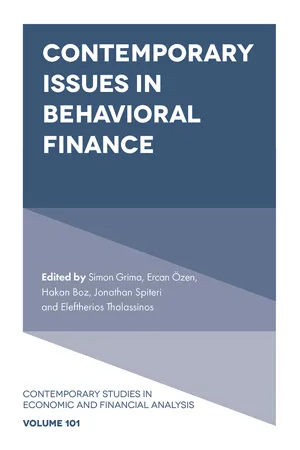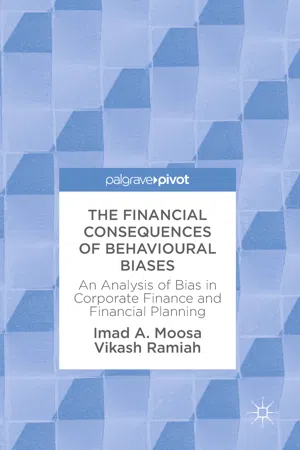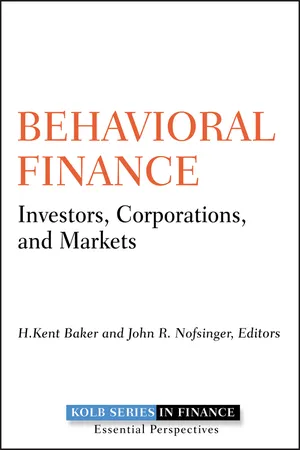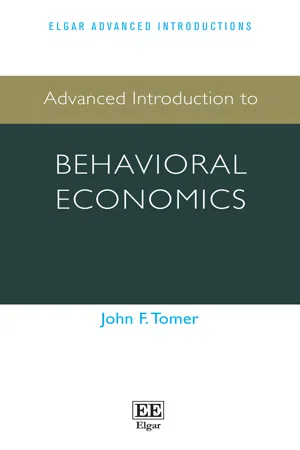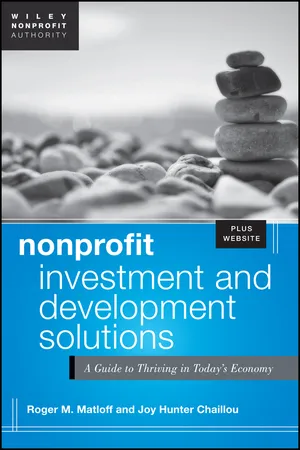Economics
Behavioral Finance
Behavioral finance is a field that combines psychology and finance to understand how individuals make financial decisions. It recognizes that people's behavior and emotions can influence their financial choices, often deviating from traditional economic theories that assume rational decision-making. Behavioral finance seeks to explain and predict these deviations, shedding light on the impact of cognitive biases and emotions on financial markets.
Written by Perlego with AI-assistance
Related key terms
1 of 5
11 Key excerpts on "Behavioral Finance"
- eBook - ePub
Behavioral Finance and Wealth Management
How to Build Investment Strategies That Account for Investor Biases
- Michael M. Pompian(Author)
- 2011(Publication Date)
- Wiley(Publisher)
At its core, Behavioral Finance attempts to understand and explain actual investor and market behaviors versus theories of investor behavior. This idea differs from traditional (or standard) finance, which is based on assumptions of how investors and markets should behave. Wealth managers from around the world who want to better serve their clients have begun to realize that they cannot rely solely on theories or mathematical models to explain individual investor and market behavior. As Meir Statman's quote puts it, standard finance people are modeled as “rational,” whereas Behavioral Finance people are modeled as “normal.” This can be interpreted to mean that “normal” people may behave irrationally—but the reality is that almost no one (actually, I will go so far as to say absolutely no one) behaves perfectly rationally, and dealing with normal people is what this book is all about. We will delve into the topic of the irrational behaviors of markets at times; however, the focus of the book is on individual investor behavior.Fundamentally, Behavioral Finance is about understanding how people make financial decisions, both individually and collectively. By understanding how investors and markets behave, it may be possible to modify or adapt to these behaviors in order to improve financial outcomes. In many instances, knowledge of and integration of Behavioral Finance may lead to better than expected results for both advisors and their clients. But advisors cannot view Behavioral Finance as a panacea or “the answer” to problems with clients. Working with clients is as much an art as it is a science. Behavioral Finance can add many arrows to the art quiver.We will begin this chapter with a review of the prominent researchers in the field of Behavioral Finance, all of whom promote a deeper understanding of the benefits of the Behavioral Finance discipline. We will then review the key differences debate between standard finance and Behavioral Finance. By doing so, we can establish a common understanding of what we mean when we say Behavioral Finance, which will in turn permit us to understand the use of this term as it applies directly to the practice of wealth management. This chapter will finish with a summary of the role of Behavioral Finance in dealing with private clients and how the practical application of Behavioral Finance can enhance an advisory relationship.Behavioral Finance: THE BIG PICTUREBehavioral Finance, commonly defined as the application of psychology to finance, has become a very hot topic, generating credence with the rupture of the tech-stock bubble in March of 2000, and has been pushed to the forefront of both investors’ and advisors’ minds with the financial market meltdown of 2008–2009. While the term Behavioral Finance is bandied about in books, magazine articles, and investment papers, many people lack a firm understanding of the concepts behind Behavioral Finance. Additional confusion may arise from a proliferation of topics resembling Behavioral Finance, at least in name, including: behavioral science, investor psychology, cognitive psychology, behavioral economics, experimental economics, and cognitive science, to name a few. Furthermore, many investor psychology books that have entered the market recently refer to various aspects of Behavioral Finance but fail to fully define it. This section will try to communicate a more detailed understanding of the term Behavioral Finance. - eBook - ePub
Behavioral Finance and Wealth Management
How to Build Optimal Portfolios That Account for Investor Biases
- Michael M. Pompian(Author)
- 2011(Publication Date)
- Wiley(Publisher)
PART OneIntroduction to the Practical Application of Behavioral FinancePassage contains an image
CHAPTER 1What Is Behavioral Finance?People in standard finance are rational. People in Behavioral Finance are normal.—Meir Statman, Ph.D., Santa Clara UniversityTo those for whom the role of psychology in finance is self-evident, both as an influence on securities markets fluctuations and as a force guiding individual investors, it is hard to believe that there is actually a debate about the relevance of Behavioral Finance. Yet many academics and practitioners, residing in the “standard finance” camp, are not convinced that the effects of human emotions and cognitive errors on financial decisions merit a unique category of study. Behavioral Finance adherents, however, are 100 percent convinced that an awareness of pertinent psychological biases is crucial to finding success in the investment arena and that such biases warrant rigorous study.This chapter begins with a review of the prominent researchers in the field of Behavioral Finance, all of whom support the notion of a distinct Behavioral Finance discipline, and then reviews the key drivers of the debate between standard finance and Behavioral Finance. By doing so, a common understanding can be established regarding what is meant by Behavioral Finance, which leads to an understanding of the use of this term as it applies directly to the practice of wealth management. This chapter finishes with a summary of the role of Behavioral Finance in dealing with private clients and how the practical application of Behavioral Finance can enhance an advisory relationship.Behavioral Finance: THE BIG PICTURE
Behavioral Finance, commonly defined as the application of psychology to finance, has become a very hot topic, generating new credence with the rupture of the tech-stock bubble in March of 2000. While the term Behavioral Finance - eBook - ePub
- (Author)
- 2023(Publication Date)
- Wiley(Publisher)
1. IntroductionResearch has demonstrated that when people face complex decisions, they often rely on basic judgments and preferences to simplify the situation rather than acting completely rationally. Although such approaches are quick and intuitively appealing, they may lead to suboptimal outcomes. In contrast to this body of research, traditional economic and financial theory generally assumes that individuals act rationally by considering all available information in the decision-making process, leading them to optimal outcomes and supporting the efficiency of markets. Behavioral Finance challenges these assumptions by incorporating research on how individuals and markets actually behave. In this reading, we explore a foundational concept of Behavioral Finance: behavioral biases. Investment professionals may be able to improve economic outcomes by understanding these biases, recognizing them in themselves and others, and learning strategies to mitigate them.The reading proceeds as follows. Section 2 describes and broadly characterizes behavioral biases. Sections 3 and 4 discuss specific behavioral biases within two broad categories: cognitive errors and emotional biases. The discussion includes a description of each bias, potential consequences, and guidance on detecting and mitigating the effects of the bias. Section 5 discusses market anomalies, which are essentially aggregate expressions of individual biases among financial market participants. A summary and practice problems conclude the reading. - No longer available |Learn more
- (Author)
- 2019(Publication Date)
- Wiley(Publisher)
1 R E A D I N G 7 © 2011 CFA Institute. All rights reserved. 1 Statman (1999). Reading 7 ■ The Behavioral Finance Perspective 6 As Behavioral Finance gains acceptance, efforts to understand what drives individ- ual investor and market behavior will increase. Complete understanding will never be possible, however, because human behavior cannot be predicted with scientific precision or fully explained by a simple “unifying theory.” In fact, trying to predict economic behavior, and by extension market behavior, has been likened to trying to predict the weather. Like weather forecasters, economic forecasters must deal with a system that is extraordinarily complex, that is subject to random shocks, and about which our data and understanding will always be imperfect. In some ways, predicting the economy is even more difficult than forecasting the weather, because the economy is not made up of molecules whose behavior is sub- ject to the laws of physics, but rather of human beings who are themselves thinking about the future and whose behavior may be influenced by the forecasts that they or others make. To be sure, historical relationships and regularities can help economists, as well as weather forecasters, gain some insight into the future, but these must be used with considerable caution and healthy skepticism. US Federal Reserve Chairman Ben Bernanke 2 At its core, Behavioral Finance is about understanding how people make decisions, both individually and collectively. By understanding how investors and markets behave, it may be possible to modify or adapt to their behaviors in order to improve economic outcomes. In many instances, this may entail identifying a behavior and then modifying the behavior so it more closely matches that assumed under the tra- ditional finance models. In other instances, it may be necessary to adapt to an iden- tified behavior and to make decisions that adjust for the behavior. - eBook - ePub
- Simon Grima, Ercan Özen, Hakan Boz, Jonathan Spiteri, Eleftherios I. Thalassinos, Simon Grima, Ercan Özen, Hakan Boz, Jonathan Spiteri, Eleftherios Thalassinos, Eleftherios I. Thalassinos, Ercan Ozen(Authors)
- 2019(Publication Date)
- Emerald Publishing Limited(Publisher)
1. INTRODUCTIONPeople make decisions by considering many factors. Classical economics/finance theories argue that people make rational decisions to gain maximum benefit (Sefil & Çilingiroğlu, 2011 , p. 247). In order to maximize the benefit according to traditional finance models, investors tend to be rational, turning low risk, high return on investments. However, at this point, the psychological factors that are ignored by the classical economy and directing the people’s future are forgotten.The concept of Behavioral Finance, which has the greatest impact on people’s economic decisions, is an approach that argues that technological, sociological, and psychological factors should be taken into account in addition to the classical economics models while explaining and predicting the purchasing activities of individuals (Altunöz & Altunöz, 2017 , p. 15).The basics of the concept of Behavioral Finance emerged in 1759 with the book “Moral Thought System” written by Adam Smith. In this book, Smith puts the foundation of the tendency to loss aversion and risk aversion by saying that individuals feel pain and regret when they go from good to bad condition and that they experience happiness when they get better from a bad situation (Cornicello, 2004 , p. 23). However, the concept of Behavioral Finance had not attracted much attention in the historical development process until the twentieth century.From the 1990s onwards, the concept of Behavioral Finance has repeatedly cropped up, amidst mounting evidence that the efficient markets hypothesis does not hold and the insufficiency of traditional theories to explain anomalies in the data (Cornicello, 2004 - eBook - PDF
The Financial Consequences of Behavioural Biases
An Analysis of Bias in Corporate Finance and Financial Planning
- Imad A. Moosa, Vikash Ramiah(Authors)
- 2017(Publication Date)
- Palgrave Macmillan(Publisher)
While neoclassical finance seeks to explain the actions of the theo- retical rational person, behavioural finance seeks to explain observed behaviour, which is significantly different from the behaviour of the rational decision maker envisaged by neoclassical thinking. According to Statman (1999), “people are rational in standard [neoclassical] finance; they are normal in Behavioral Finance”. Behavioural finance provides explanations for why market participants make irrational sys- tematic errors, contrary to the neoclassical assumption of rationality, which implies that market participants are immune to systematic errors. Inefficiencies, such as under-reaction and overreactions to the arrival of new information, may lead to the formation of bubbles, which are bound to be followed by crashes. Various kinds of biases lead to dispro- portional reactions. Behavioural finance is based on the following assumptions: (i) inves- tors do not simply look at mean–variance configurations to make investment decisions as they may be influenced by other non-statisti- cal characteristics such as taste, preference and other psychological fac- tors; (ii) investors may perceive trends even though no obvious pattern is present; (iii) imperfect information exists in the presence of trader heterogeneity; (iv) different investors tend to have different investment opportunities, depending on taste, while herd behaviour may result in a common taste; and (v) the market is not necessarily in equilibrium, and while arbitrage opportunities exist they may be subject to market sentiment. Shiller (2003) defines behavioural finance as “finance from a broader social science perspective including psychology and sociology”, describing it as “one of the most vital research programs” and that “it stands in sharp contradiction to much of efficient markets theory”. - eBook - ePub
Behavioral Finance
Investors, Corporations, and Markets
- H. Kent Baker, John R. Nofsinger, H. Kent Baker, John R. Nofsinger(Authors)
- 2010(Publication Date)
- Wiley(Publisher)
2. The answer to this question is both yes and no. As a general rule, teaching some Behavioral Finance to students and professionals is better than not teaching any. Not teaching students about Behavioral Finance is effectively equivalent to denying them access to learning how corporate managers, investment professionals, and consumers actually make their decisions. On the other hand, because the fast-growing field of Behavioral Finance has accumulated enough robust content, the subject can be used in stand-alone courses.3. Given the nature of financial decision making, which involves both qualitative and quantitative analysis, effective Behavioral Finance cases should cover both dimensions. Mini-cases are often available at the end of some textbooks. They provide good learning experiences on both the quantitative and qualitative aspects of financial decision making. Given the current stage of development in this field, there are relatively few comprehensive books and cases on Behavioral Finance compared to those in traditional finance. Teaching Behavioral Finance classes is similar to teaching traditional finance classes because both involve making decisions, whether they are modeled, mathematically or cognitively.4. What scholars are learning about human behavior in making finance-related decisions is growing exponentially. Anecdotal evidence of “anomalies” in the movement of share prices has been addressed in finance texts for more than 30 years. Several decades after the seminal works of Tversky and Kahneman (1971) and Kahneman and Tversky (1979), the impact of cognitive psychology on investor and manager financial decision-making behavior is covered with selective topics in many traditional texts. The implications of recent advances in neuroscience are now being fully integrated into Behavioral Finance research. Insufficient capacity exists in traditional texts to provide adequate treatment of a field of study that integrates finance concepts, principles, and theories with the findings of cognitive psychology and neuroscience. This justifies incorporating a comprehensive Behavioral Finance course within the finance curriculum. While this adds to the finance curriculum subject matter that is not traditionally considered finance-oriented, the complexities of making good financial decisions demand that finance students understand the world as it is. To do less perpetuates the perverse effects of biases, heuristics, and framing in the decision making of future managers, analysts, and investors. - eBook - ePub
Valuations of Early-Stage Companies and Disruptive Technologies
How to Value Life Science, Cybersecurity and ICT Start-ups, and their Technologies
- Tiran Rothman(Author)
- 2020(Publication Date)
- Palgrave Macmillan(Publisher)
uncertainties .Traditional finance theory relies on the utility theory, which projects the combination of commodities that a person or a society would receive to maintain a given level of satisfaction (Von Neumann and Morgenstern 1944 ). In investing, utility expects investors to be rational in their decision making. Contrary to this view, Behavioral Finance criticizes the logical viewpoint, arguing that whenever investors make investment decisions, they tend to deviate from rationality . Over the years, several behavioral biases that may occur in investment decision making have been studied and tested empirically. Behavioral Finance became a new concept in the 1990s, integrating psychological and behavioral aspects in financial and economic decision making. The efficient market perspective is challenged by Behavioral Finance. In addition, Behavioral Finance helps to explain why investors behave in a particular way when they invest in financial assets.Many studies have been conducted on such behavioral biases, attributing them to investors’ optimism and overconfidence , disposition effect, herd behavior, and home bias (Kumar and Goyal 2015 ). When investing at an early stage, usually done by venture capital (or VC) investors, the “fear of missing out” and information overload escalate the burden on VC investors. They are forced to adopt a herding behavior towards reputable and familiar firms rather than analyzing the available information for them to choose other firms that could be less risky in order to obtain potentially higher returns over time . The regrets they might have outweigh the economic benefit and potential psychological burden of acting against the trend. Investment in early-stage firms equalizes returns and risks, and venture capital is no exception. Risk perception is underweighted when herding occurs, and it results in low abnormal returns. Investors expect to earn profits from the asset they have bought, and over the time - John F. Tomer(Author)
- 2017(Publication Date)
- Edward Elgar Publishing(Publisher)
68 6 Behavioral Finance Behavioral Finance (BF) is essentially BE applied to the financial arena. To a considerable extent, BF draws on insights and analyses from psy- chology as psychological economics (PE) does (see Chapter 4), but it also draws on insights from a variety of other social sciences. Besides the social sciences, BF’s origins are in financial theory, particularly the theory related to the pricing of speculative assets such as stocks and bonds. To understand how BF emerged from standard financial theory, it is necessary to begin by explaining the concept of efficient markets. Efficient markets In an efficient financial market, the prices of financial assets like stocks equal the intrinsic (or fundamental) values of these assets. According to the Efficient Market Hypothesis (EMH), the intrinsic value of secu- rities will always faithfully reflect all that can be known about their present conditions and future prospects (Malkiel 1999, p. 29). If fol- lows that the intrinsic value of a stock will equal the present or dis- counted value of all the future dividends that an owner of the stock can expect to receive. These dividend expectations are those of rational, independent investors whose expectations are based on all relevant publicly available information (Shleifer 2000, pp. 1–2). Similar to neo- classical economics (NE), the EMH assumes that the people who invest are not only extremely rational but also “cunningly efficient proces- sors of financial information” (Shiller 2005, pp. xx–xxi). According to proponents of EMH, U.S. bond and stock markets are actually efficient (Shleifer 2000, p. 1). In these efficient markets, it is not possible to fore- cast changes in stock prices. This is because these stock prices change only in response to news (by definition, not previously known infor- mation). When news occurs, this causes rational investors to revise their expectations and, consequently, the estimates of their securi- ties’ intrinsic value.- eBook - ePub
Nonprofit Investment and Development Solutions
A Guide to Thriving in Today's Economy
- Roger Matloff, Joy Hunter Chaillou(Authors)
- 2013(Publication Date)
- Wiley(Publisher)
The concept of money is actually far more complex than most realize. Ask almost anyone why a hundred dollar bill, which is after all just a piece of paper, has value and they could not explain it to you. Yet, having money in your pocket and in your bank account is a satisfying experience, just as scrimping your way through the day only to return home to an ocean of debt is a destructive one.More often than not, it's not about having enough to eat, or clothes on our back—it's about money itself. And so it should come as no surprise that our behavior concerning money and investments has deeply rooted motivations, many of them concealed from our conscious thoughts, nor should it be surprising that when it comes to money we lie to ourselves—a lot.Behavioral Factors and Investing
Financial decision-making is to a degree the result of rational thought and knowledge, but it is also the consequence of values, emotions, and bias. Though their effects are not fully understood, the stock market is known often to reflect the buying and selling patterns of a mass market driven by individual psychological forces. In fact, a fair degree of market volatility is considered to be the consequence of people behaving a certain way just because that's what others are doing, or because they are following a fad. The spread of certain mass behavior toward the market, either buying or selling, has been compared to that of the spread of an epidemic.Investors generally believe they act independently of emotional and psychological impulses. They consider themselves to be rational and objective when it comes to making investment decisions. They tell themselves, and others, that they analyze key factors, obtain pertinent information, and then make calculated decisions designed to optimize their investment income.To a certain extent this is very often true. What they do not acknowledge, though, is the role human psychology—our essential personality—plays in making many of the choices that lead to the final decision. For example, many years ago the investor may have had an unpleasant encounter with a broker at one of the major investment banking institutions. Never mind that the firm offers superior resources and advice, the investor never accesses any of their information, shutting him or her off from valuable insight. - eBook - PDF
Principles of Behavioral Economics
Bringing Together Old, New and Evolutionary Approaches
- Peter E. Earl(Author)
- 2022(Publication Date)
- Cambridge University Press(Publisher)
1 What Is Behavioral Economics? 1.1 Introduction A recurring theme in this book is the necessity of recognizing that people differ in how they see things. This applies not merely to, say, how they see a particular product, job opportunity or business strategy but also to how economists characterize behavioral economics. It is possible to get a sense of this by comparing my 1988 characterizations of behavioral economics (in the introduction to Earl, 1988) with those offered later by Tomer (2007) and Thaler (2015) or by contrasting the coverage in textbooks such as Baddeley (2013), Cartwright (2014), Dhami (2016) and Wilkinson (2012). What behavioral economics has been taken to be has changed over the years, with a particularly major change occurring in the last two decades of the twentieth century. But historical accounts of this differ, too: see Sent (2004) and Heukelom (2014). There is not even a consensus about when the first “behavioral” contributions to economics were made. In this book, the oldest sources referred to are Adam Smith’s Theory of Moral Sentiments, published in 1756, and his history of astronomy, published posthumously in 1795; otherwise, the earliest sources come from the period 1870–1910. However, it was not until after World War II that the adjective “behavioral” started being applied to some contributions to economics, most notably George Katona’s pioneering attempts to apply psychology to understanding macroeconomic phenomena (e.g., Katona, 1951) and Herbert Simon’s (1955) work on decision-making. Simon’s con- tributions earned him the 1978 Alfred Nobel Memorial Prize in Economics Sciences, but nowadays it is common to see his work being completely ignored by those who call themselves behavioral economists. Simon’s focus was on decision-making in organizations, and it led to the development of a “behavioral theory of the firm” by his colleagues Richard Cyert and James March (1963).
Index pages curate the most relevant extracts from our library of academic textbooks. They’ve been created using an in-house natural language model (NLM), each adding context and meaning to key research topics.
